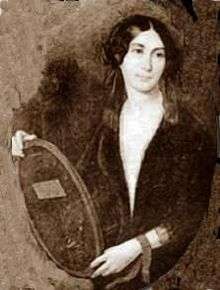Louise-Victorine Ackermann
| French literature |
|---|
| by category |
| French literary history |
| French writers |
|
| Portals |
|

Louise-Victorine Ackermann (née Choquet) (30 November 1813 – 2 August 1890) was a French poet.
She was born in Paris, but spent her younger days in more rural surroundings near Montdidier, south-east of Amiens. In 1829 her father, having undertaken her early education, in the philosophy of the Encyclopaedists, sent her to school in Paris; in 1838 Victorine Choquet went to Berlin to study German, and there married in 1843 Paul Ackermann, an Alsatian philologist. After little more than two years of happy married life her husband died, and Madame Ackermann went to live in Nice with a favorite sister. In 1855 she published Contes en vers, and in 1862 Contes et poésies.[1]
Very different from these simple and charming contes is the work on which Madame Ackermann's real reputation rests. She published in 1874 Poésies, premières poésies, poésies philosophiques, a volume of sombre and powerful verse, expressing her revolt against human suffering. The volume was enthusiastically reviewed in the Revue des deux mondes for May 1871 by Elme Marie Caro, who, though he deprecated the impiété désespérée of the verses, did full justice to their vigour and the excellence of their form.[1]
Soon after the publication of this volume Madame Ackermann moved back to Paris, where she gathered round her a circle of friends, but published nothing further except a prose volume, the Pensées d'un solitaire ("Thoughts of a Recluse", 1883), to which she prefixed a short autobiography. She died at Nice on 2 August 1890.[1]
References
- 1 2 3
 One or more of the preceding sentences incorporates text from a publication now in the public domain: Chisholm, Hugh, ed. (1911). "Ackermann, Louise Victorine Choquet". Encyclopædia Britannica. 1 (11th ed.). Cambridge University Press. p. 148. Endnotes:
One or more of the preceding sentences incorporates text from a publication now in the public domain: Chisholm, Hugh, ed. (1911). "Ackermann, Louise Victorine Choquet". Encyclopædia Britannica. 1 (11th ed.). Cambridge University Press. p. 148. Endnotes:
- See also Anatole France, La vie littéraire, 4th series (1892);
- the comte d'Haussonville, Mme Ackermann (1882);
- M. Citoleux, La poésie philosophique au XIXe siècle (vol. 1., Mme Ackermann d'après de nombreux documents inédits, Paris, 1906).